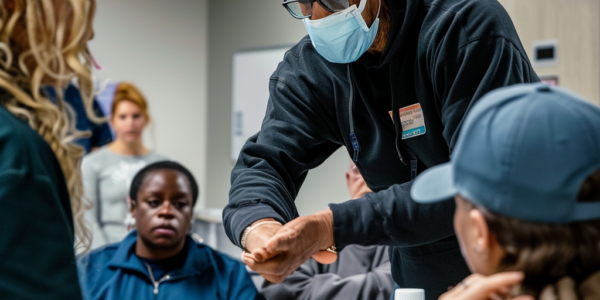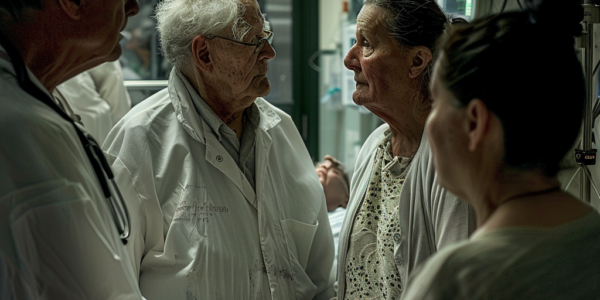Study Reveals Lingering Impact of Tuskegee Syphilis Study on Black Americans’ COVID-19 Vaccine Uptake
A recent study by the University of Georgia reveals the lingering impact of the Tuskegee Syphilis Study on Black Americans’ willingness to receive the COVID-19 vaccine. Lead author Xiaolong ‘Chris’ Hou highlighted the concerning findings, emphasizing the need to address historical injustices that contribute to persistent health disparities. The study’s findings underscore the enduring impact of historical events on healthcare behaviors and the importance of addressing underlying factors perpetuating disparities in vaccine uptake.
AACR Annual Meeting 2024: Latest Advances in Cancer Science and Medicine
The AACR Annual Meeting 2024 in San Diego, California will feature presentations and discussions on the most recent developments in cancer research, with a focus on innovative treatments, diagnostic techniques, and advancements in understanding the underlying mechanisms of cancer. Attendees can expect to gain valuable knowledge and engage in discussions with experts, while the event will also provide networking opportunities for professionals and researchers to collaborate and exchange ideas. The ACC and Perelman School of Medicine at the University of Pennsylvania will be sharing cutting-edge research data, offering insights that could shape the future of cancer science and medicine. Follow @PennMedicine and @PennMDForum for real-time updates and insights from the event.
Study Reveals Link Between SARS-CoV-2 and Synaptic Homeostasis in the Brain
Recent research published in Nature Microbiology reveals the impact of SARS-CoV-2 on synaptic homeostasis in the brain and its potential role in COVID-19-related neurological disorders. The study found that SARS-CoV-2 infection leads to the upregulation of synaptic components and disrupts local electrical field potential, indicating a direct impact on synaptic function. These findings offer valuable molecular insights into the interaction between SARS-CoV-2 and the brain, potentially leading to targeted interventions and therapies for COVID-19-related neurological complications.
The Role of Artificial Intelligence in Early Diagnosis of Sepsis and Critical Conditions in Healthcare
Artificial intelligence (AI) is revolutionizing the healthcare industry by improving early diagnosis and patient outcomes. With 1 in 3 Americans who pass away in a hospital setting having sepsis, the urgent need for AI advancements is clear. By leveraging AI technology, healthcare professionals can detect sepsis earlier, leading to more timely interventions and improved patient outcomes. The potential benefits of AI in improving the detection and management of sepsis underscore the importance of ongoing advancements in this field.
Chinese Scientists Make Groundbreaking Discovery in Pancreatic Cancer Treatment
Chinese scientists have discovered two protein markers that may predict chemotherapy sensitivity in pancreatic cancer, offering hope for improved survival rates. The groundbreaking study, published in Nature Medicine, could revolutionize the diagnosis and treatment of the most common subtype of pancreatic cancer, offering new hope for patients and the medical community.
PeaceHealth to Construct 67,000 Square-Foot Rehab Hospital in Springfield
PeaceHealth has received approval to construct a 67,000-square-foot rehabilitation hospital in Springfield, Oregon. The facility, majority owned by PeaceHealth and operated by LifePoint Rehabilitation, will provide physical, speech, and occupational therapies for individuals who have experienced catastrophic medical events. The estimated cost of the project is $72 million, with completion expected by January 2026. The new hospital will include the region’s first brain injury unit and address a significant community need for inpatient rehabilitation services.
Opioid Overdoses on the Rise in Spokane County, Urgent Need for Community Involvement
Opioid overdoses are increasing in Spokane County, prompting advocates to call for a state of emergency. Community members are urged to be prepared to administer naloxone, with resources available for education and training. Washington state’s Good Samaritan laws provide legal protection for those providing aid in overdose situations.
Improved Cancer Tests Lead to Better Treatments
University of Oklahoma research has introduced a promising strategy for better cancer tests, leading to more effective treatments. The study compares the efficacy of immunohistochemistry (IHC) and next-generation sequencing (NGS) in detecting patients best suited for immunotherapy, with NGS proving superior. This research not only highlights the need for reevaluation of current testing recommendations but also paves the way for a more personalized approach to cancer treatment, ultimately improving patient life quality and making cancer less deadly.
Study Finds Inappropriate Diagnosis of Pneumonia Common in Hospitalized Adults
Inappropriate diagnosis of community-acquired pneumonia (CAP) in hospitalized adults is common, especially among older adults and those with dementia, according to a study published in JAMA Internal Medicine. The study found that 12.0 percent of hospitalized patients treated for CAP met criteria for inappropriate diagnosis, with 87.6 percent receiving full antibiotic courses. The study highlights the importance of accurate diagnosis and appropriate antibiotic treatment to minimize the risks associated with underdiagnosis and overdiagnosis of CAP.
Groundbreaking Technique Could Diagnose Deadly Cancer in 30 Seconds
Groundbreaking new technique developed by experts can potentially diagnose one of the deadliest cancers in just 30 seconds. Named RaPIDE, the method utilizes laser-based Raman spectroscopy to rapidly identify cancerous tissues or cells using light. This innovative approach has the potential to revolutionize the diagnosis and treatment of oesophageal cancer, ultimately saving lives and improving patient outcomes.










